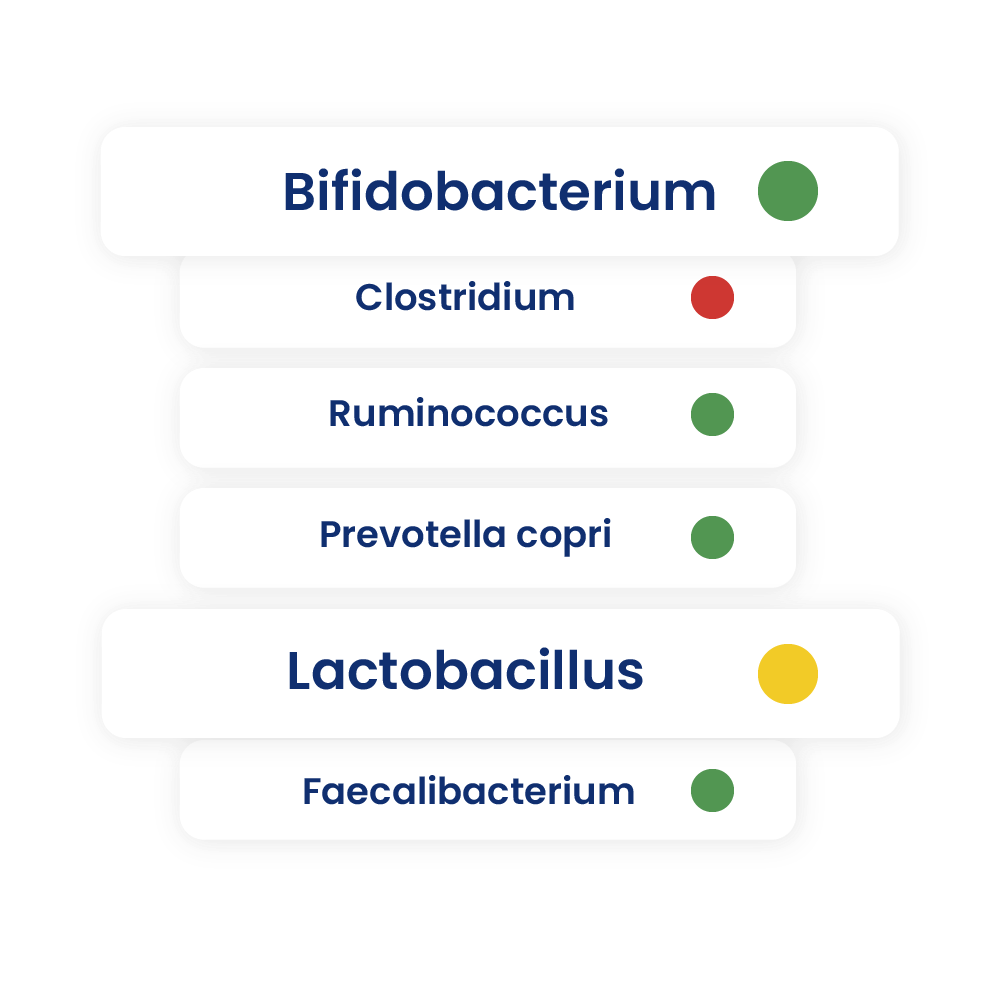
Medically reviewed by Kate Hilton RD
On 16 April 2024
What is an unhealthy gut?
An unhealthy gut is where the balance between good and bad bacteria within the gastrointestinal tract is disrupted, causing an imbalance we call gut dysbiosis. An unhealthy gut can lead to poor overall health and impact digestion, nutrient absorption, immunity, mood and increase our risk of developing chronic diseases.
Poor gut health is usually the result of several factors, from diet and lifestyle choices to medication and viruses, the good news is that poor gut health can usually be addressed and fixed by adopting healthier habits.
What causes poor gut health?
Poor gut health can develop from a number of things that can promote the growth of bad bacteria within the gut. Here are the most common causes of poor gut health:
- Dietary habits: Common western diets consist of consuming processed foods, high sugars, and saturated fats. A lack of daily fibre rich foods can also have a detrimental effect on the gut.
- Excessive use of antibiotics and medicines: Antibiotics are typically used to target and remove harmful pathogens, in doing so they can also destroy beneficial gut bacteria, leading to an imbalance. Other medicines such as NSAIDs (non-steroidal anti-inflammatory drugs) can also damage the lining of the gut.
- Chronic stress: Prolonged stress can impact the gut-brain axis which can lead to a range of digestive and cognitive issues that affect mood and the balance of our gut.
- Inadequate sleep: Broken sleep or poor sleep patterns and lack of restorative sleep can contribute to gut dysbiosis, affecting the overall function and health of the digestive system.
- Alcohol and smoking: both can lead to increased permeability (leaky gut) by damaging the gut lining. It can also cause an imbalance of the good and bad bacteria within our gut.
- Lack of exercise: Physical inactivity can lead to decreased gut motility and reduced microbial diversity, contributing to poor gut health.
Signs of poor gut health
The signs of an unhealthy gut can be felt throughout the body in multiple ways, common signs include:
- Digestive discomfort such as bloating, gas, diarrhoea, and constipation.
- Frequent heartburn.
- Sensitivities to foods that previously caused no issues.
- Unexplained weight fluctuations.
- Persistent fatigue or chronic fatigue syndrome.
- Poor sleep quality.
- Psychological effects like anxiety, depression, or mood swings.
- Disruptions to the gut-skin axis that may result in skin irritations such as eczema, acne, or rosacea.
- Weakened immune system and increased susceptibility to infections.
Does poor gut health lead to anything long-term?
Over time, an unhealthy gut can lead to more severe health issues, such as:
- Chronic diseases: Increased risk of obesity, type 2 diabetes, heart disease, and metabolic disorders.
- Increased gut permeability: Damage to the lining of the gut can allow harmful toxins to pass through to the bloodstream, also known as leaky gut/increased gut permeability.
- Autoimmune diseases: Heightened risk of developing inflammatory conditions like rheumatoid arthritis, lupus, and thyroid disorders.
- Mental health issues: Due to the gut brain axis, gut dysbiosis is associated with mood disorders, depression, anxiety, and stress-related conditions.
- Neurological Conditions: Research shows a potential link to neurodegenerative diseases, such as Alzheimer's and Parkinson's disease.
- IBS: Poor gut health has been known to contribute to the development and severity of IBS.
Sources – The role of the gut microbiome in chronic diseases.
How do I know if my gut is unhealthy?
Knowing if your gut is unhealthy can be determined by:
- Observing symptoms: The symptoms you experience will give you the biggest idea of the health status of your gut. Everyone can experience certain symptoms from time to time, with no reason behind them. However, if your symptoms are persistent, it could indicate a gut imbalance.
- Gut health tests: A gut health test is the most comprehensive way to check the health of your gut and how it is impacting your overall health. A gut health test will measure the bacteria within your gut to identify a potential imbalance. It will also give you insights into what conditions you are at risk of developing based on the bacteria and balance of your gut.
Want to know what a healthy gut microbiome looks like? Read our detailed guide that explains more!
How do you fix bad gut health?
To enhance gut health, here are some simple changes you can make to your day-to-day routines:
- Improve your diet: Cut out processed foods and incorporate a variety of whole foods, fibre rich fruits and vegetables that can promote the growth of beneficial bacteria.
- Include probiotic and prebiotic foods: Include foods like yogurt, kefir, sauerkraut (probiotics), and garlic, onions, and asparagus (prebiotics) to support microbial balance and help nourish your beneficial gut bacteria.
- Manage stress levels: High stress levels are known to directly affect gut health. Practicing stress reduction techniques such as mindfulness, yoga or even regular exercise can help to reduce your stress levels.
- Schedule sleep into your day: Like you would with your lunch and other daily tasks, schedule sleep into your day to ensure you capture between 7-9 hours per day.
- Limit antibiotics and NSAIDs: Although sometimes necessary, antibiotics and NSAID’s can destroy beneficial gut bacteria. Try to limit antibiotic and NSAID use where possible.
Can poor gut health cause anxiety?
Yes, poor gut health can cause a number of mental health issues such as anxiety, depression, and fatigue. The gut-brain axis has been researched extensively, and evidence shows that gut dysbiosis can impact the gut brain axis, affecting our mood in the process.
Our thoughts
maintaining a healthy gut is vital for overall health and well-being. Identifying the signs of an unhealthy gut and taking steps to improve gut health can prevent long-term health complications and enhance the quality of life.



